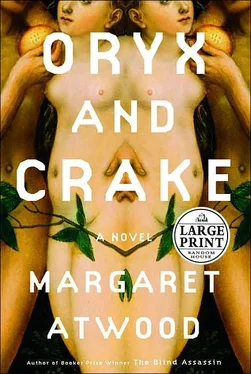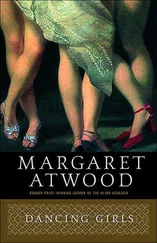“Snowman! Snowman!” They touch him gently with their fingertips. “You are back with us!”
“We knew we could call you, and you would hear us and come back.”
Not Amen , then. Snowman .
“We made a picture of you, to help us send out our voices to you.”
Watch out for art , Crake used to say. As soon as they start doing art, we’re in trouble. Symbolic thinking of any kind would signal downfall, in Crake’s view. Next they’d be inventing idols, and funerals, and grave goods, and the afterlife, and sin, and Linear B, and kings, and then slavery and war. Snowman longs to question them—who first had the idea of making a reasonable facsimile of him, of Snowman, out of a jar lid and a mop? But that will have to wait.
“Look! Snowman has flowers on him!” (This from the children, who’ve noticed his new floral sarong.)
“Can we have flowers on us too?”
“Was it difficult, your journey into the sky?”
“Flowers too, flowers too!”
“What message does Crake send us?”
“Why do you think I’ve been into the sky?” Snowman asks, as neutrally as possible. He’s clicking through the legend files in his head. When did he ever mention the sky? Did he relate some fable about where Crake had come from? Yes, now he remembers. He’d given Crake the attributes of thunder and lightning. Naturally they assume Crake must have gone back up to cloudland.
“We know Crake lives in the sky. And we saw the whirling wind—it went the way you went.”
“Crake sent it for you—to help you rise from the ground.”
“Now you have been to the sky, you are almost like Crake.”
Best not to contradict them, but he can’t let them continue in a belief that he can fly: sooner or later they might expect him to demonstrate. “The whirling wind was so Crake could come down out of the sky,” he says. “He made the wind to blow him down from above. He decided not to stay up there, because the sun was too hot. So that isn’t where I saw him.”
“Where is he?”
“He’s in the bubble,” Snowman says, truthfully enough. “The place we came from. He’s in Paradice.”
“Let us go there and see him,” says one of the older children. “We know how to get there. We remember.”
“You can’t see him,” Snowman says, a little too sharply. “You wouldn’t recognize him. He’s turned himself into a plant.” Now where did that come from? He’s very tired, he’s losing it.
“Why would Crake become food?” asks Abraham Lincoln.
“It’s not a plant you can eat,” says Snowman. “It’s more like a tree.”
Some puzzled looks. “He talks to you. How does he talk, if he is a tree?”
This is going to be hard to explain. He’s made a narrative mistake. He has the sensation that he’s lost his balance at the top of a flight of stairs.
He flails for a grip. “It’s a tree with a mouth,” he says.
“Trees don’t have mouths,” says one of the children.
“But look,” says a woman—Madame Curie, Sacajawea? “Snowman has hurt his foot.” The women can always sense his discomfort, they try to ease it by changing the subject. “We must help him.”
“Let us get him a fish. Would you like a fish now, Snowman? We will ask Oryx to give us a fish, to die for you.”
“That would be good,” he says with relief.
“Oryx wants you to be well.”
Soon he’s lying on the ground and they’re purring over him. The pain lessens, but although they try very hard, the swelling will not go all the way down.
“It must have been a deep hurt.”
“It will need more.”
“We will try again later.”
They bring the fish, cooked now and wrapped in leaves, and watch joyfully while he eats it. He’s not that hungry—it’s the fever—but he tries hard because he doesn’t want to frighten them.
Already the children are destroying the image they made of him, reducing it to its component parts, which they plan to return to the beach. This is a teaching of Oryx, the women tell him: after a thing has been used, it must be given back to its place of origin. The picture of Snowman has done its work: now that the real Snowman is among them once more, there is no reason for the other, the less satisfactory one. Snowman finds it odd to see his erstwhile beard, his erstwhile head, travelling away piecemeal in the hands of the children. It’s as if he himself has been torn apart and scattered.
“Some others like you came here,” says Abraham Lincoln, after Snowman has done his best with the fish. He’s lying back against a tree trunk; his foot is gently tingling now, as if it’s asleep; he feels drowsy.
Snowman jolts awake. “Others like me?”
“With those other skins, like you,” says Napoleon. “And one of them had feathers on his face, like you.”
“Another one had feathers too but not long feathers.”
“We thought they were sent by Crake. Like you.”
“One was a female.”
“She must have been sent by Oryx.”
“She smelled blue.”
“We couldn’t see the blue, because of her other skin.”
“But she smelled very blue. The men began to sing to her.”
“We offered her flowers and signalled to her with our penises, but she did not respond with joy.”
“The men with the extra skins didn’t look happy. They looked angry.”
“We went towards them to greet them, but they ran away.”
Snowman can imagine. The sight of these preternaturally calm, well-muscled men advancing en masse , singing their unusual music, green eyes glowing, blue penises waving in unison, both hands outstretched like extras in a zombie film, would have to have been alarming.
Snowman’s heart is going very fast now, with excitement or fear, or a blend. “Were they carrying anything?”
“One of them had a noisy stick, like yours.” Snowman’s spraygun is out of sight: they must remember the gun from before, from when they walked out of Paradice. “But they didn’t make any noise with it.” The Children of Crake are very nonchalant about all this, they don’t realize the implications. It’s as if they’re discussing rabbits.
“When did they come here?”
“Oh, the day before, maybe.”
Useless to try to pin them down about any past event: they don’t count the days. “Where did they go?”
“They went there, along the beach. Why did they run away from us, oh Snowman?”
“Perhaps they heard Crake,” says Sacajawea. “Perhaps he was calling to them. They had shiny things on their arms, like you. Things for listening to Crake.”
“I’ll ask them,” says Snowman. “I’ll go and talk with them. I’ll do it tomorrow. Now I will go to sleep.” He heaves himself upright, winces with pain. He still can’t put much weight on that foot.
“We will come too,” say several of the men.
“No,” says Snowman. “I don’t think that would be a very good idea.”
“But you are not well enough yet,” says the Empress Josephine. “You need more purring.” She looks worried: a small frown has appeared between her eyes. Unusual to see such an expression on one of their perfect wrinkle-free faces.
Snowman submits, and a new purring team—three men this time, one woman, they must think he needs strong medicine—hovers over his leg. He tries to sense a responding vibration inside himself, wondering—not for the first time—whether this method is tailored to work only on them. Those who aren’t purring watch the operation closely; some converse in low voices, and after half an hour or so a fresh team takes over.
He can’t relax into the sound as he knows he should, because he’s rehearsing the future, he can’t help it. His mind is racing; behind his half-closed eyes possibilities flash and collide. Maybe all will be well, maybe this trio of strangers is good-hearted, sane, well-intentioned; maybe he’ll succeed in presenting the Crakers to them in the proper light. On the other hand, these new arrivals could easily see the Children of Crake as freakish, or savage, or non-human and a threat.
Читать дальше












